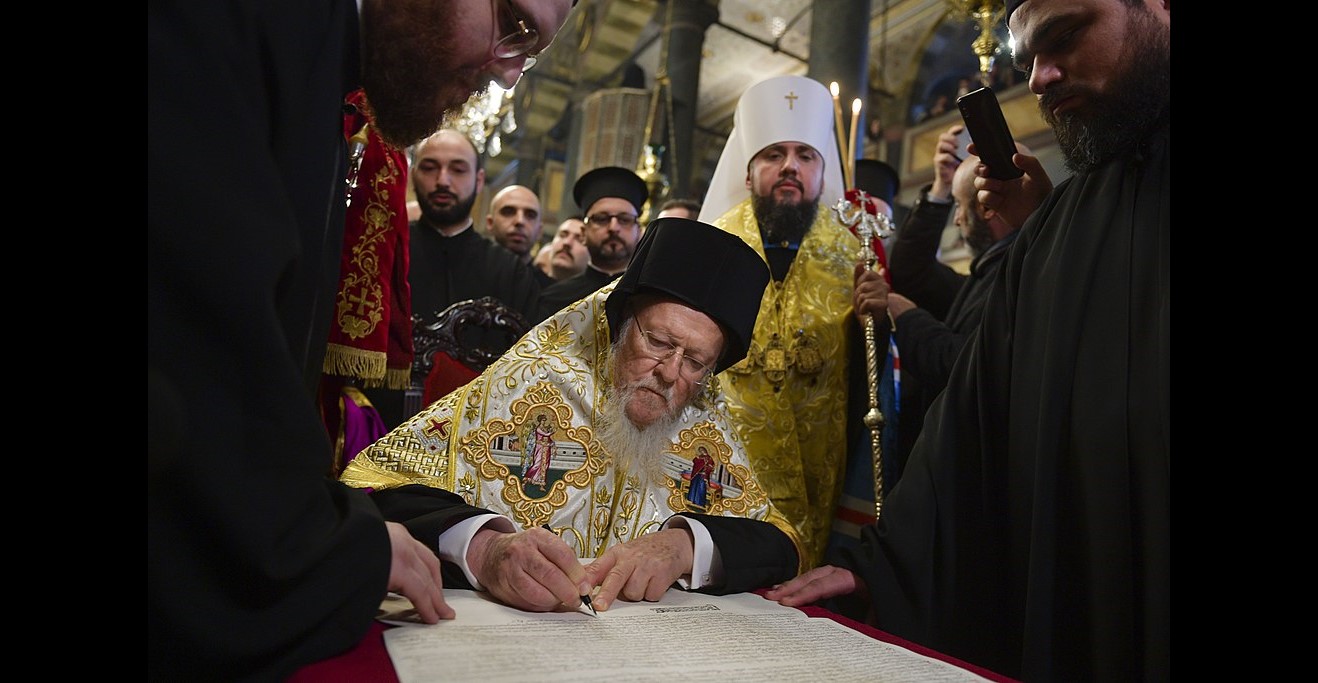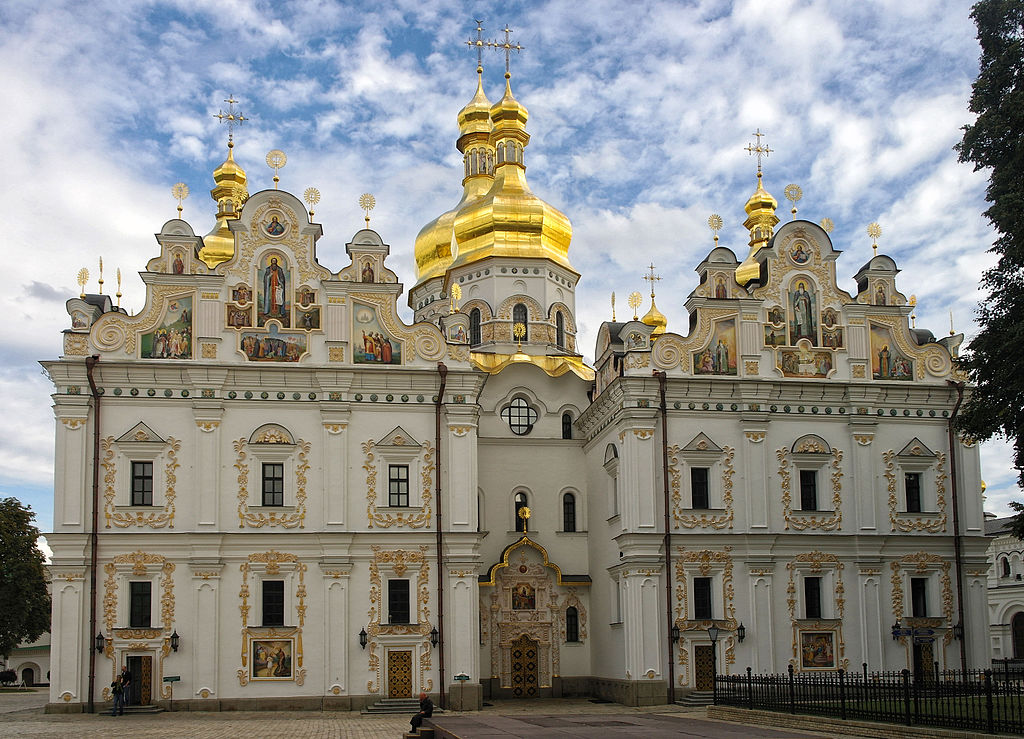On 15 December 2018, bishops from the three disunited Orthodox Churches in Ukraine convened to elect the Primate of a united church — Metropolitan Epifaniy. He received the long-awaited Tomos of church autocephaly from the Ecumenical Patriarch Bartholomew on 6 January 2019. Now, the once schismatic Ukrainian Church of the Kyiv Patriarchate (UOC KP) and Ukrainian Autocephalous Orthodox Church (UAOC) have officially dissolved their structures and united into Orthodox Church of Ukraine (OCU). They were joined by two bishops from the Ukrainian Orthodox Church of the Moscow Patriarchate (UOC MP), an affiliate of the Russian Orthodox Church.
Now parishes are moving from the Moscow Patriarchate to the newborn united church. The first parish left the Moscow Patriarchate two days after the Unification council — on 17 December. However, it would be misleading to say that this transition of parishes is something totally new for Ukraine and that it was stimulated by the government.
When the transition began
In 1991, as soon as Ukraine became independent, many Orthodox parishes in Western Ukraine reverted to the reborn Ukrainian Greek Catholic Church - a Byzantine Rite Church subordinated to the Pope. Simultaneously, two Orthodox churches independent from Moscow Patriarchate but unrecognized by world Orthodoxy, the UOC KP and UAOC, emerged in Ukraine.
The first well-known case of a single parish leaving the Moscow Patriarchate and turning to the UOC KP happened in 1997. It was a Cathedral in Kherson city which was expelled from the Moscow Patriarchate because of usage of modern technologies during liturgy and a general liberalization. The local priest visited UOC KP Patriarch Filaret and the parish was included to this Church.
Between 1997 and 2012, a number of parishes decided to leave the Moscow Patriarchate and appended themselves to the UOC KP.
After the Euromaidan Revolution, a new wave of the movement started. At least 62 parishes left the Moscow Patriarchate for the UOC KP since 2014 and up to 15 December 2018, when the Unification Council created a new unified Ukrainian church. They are marked in red on the map of transitions of parishes below. The ones that left the Moscow Patriarchate after the Unification Council are in green.
The Unification Council didn’t ban the UOC MP in Ukraine; neither did it force parishes to change their affiliation nor created a new mechanism for transitioning. The only thing that changed is that the UOC MP now has a canonical, i.e. legitimate alternative in Ukraine. Previously, the UOC KP and UAOC were considered schismatic by the family of 15 world Orthodox Churches. Now, after the intervention of Ecumenical Patriarch Bartholomew, they were legitimized, and the newly-created OCU is now #16 in the list of Churches. This accelerated the speed of the transition of UOC MP parishes.

How many parishes?
Metropolitan Epifaniy has stated that the newborn OCU numbers 7,000 parishes. Our data suggest that the actual number may be smaller: according to statistical data, prior to the Unification Council, the UOC KP and UAOC together numbered 5,855 parishes, while the UOC MP had over 12,000. Despite the smaller amount of parishes, the UOC KP boasted more believers than the UOC MP, and unaffiliated believers were in second place. This doesn’t mean that the number of parishes will inevitably move to the OCU in order to equalize the relative proportion of believers per church. However, this beckons the question whether some people, though affiliating themselves with Kyiv Patriarchate or “Just Orthodox” attended churches of the Moscow Patriarchate because it was the only available one. These issues are not yet clearly examined, but the fact of tremendous disproportions is visible.

The model of voting and problems that parishes face
As Metropolitan Epifaniy told in his interview, “we understand that the Russian Orthodox Church will remain in Ukraine in the future, and many will want to stay there, but we have nothing against it. Everyone should choose their religious center voluntarily. A bishop with the diocese or a priest with the community must make the choice. If they decide at a general meeting that they want to join the newly created OCU voluntarily, then they will join us, and we accept them in our structure of a united OCU.”
This sounds democratic and corresponds to Ukrainian laws. The church property in Ukraine does not belong to the central Church administration but to the local religious communities, each of which owns its church building, and makes decisions for the parish according to its own statute (art. 8 of the Law "On Freedom of Thought and Religious Organizations").
However, the problem is that this “religious community,” especially if located in a city or large village, is not clearly defined. Usually, unlike political communities, there are no lists of the members of a parish and no formal procedures to attain such a membership.
Contrary to claims by Russian propaganda outlets and the letter of Moscow Patriarch Kirill to the Pope and Western political powers, the voting should not be conducted by the municipality, but by the religious community. Members of such a community should be clearly defined by the very community in its statute. Judicially, the Ukrainian law describes a fully democratic process of the transitioning of a parish, securing the rights of minorities.
But speaking honestly, the law is not always perfectly implemented. It’s not that some raiders occupy churches or that the state tries to influence the Church, as Russian propaganda claims. But because of improperly organized voting, without lists of participants, and the opposition's rejection of legitimate decisions, a number of parishes got stuck in unsolved disputes.
For example, in Krasnovolia village in Volyn Oblast, the decision of the parish’s migration to the OCU was made by villagers who weren't all churchgoers. The local priest, who wanted to stay in the UOC MP, appealed to this fact. Later, the parish conducted a general meeting of the religious community where 37 people voted for the change of affiliation while 23 were against.
This is slightly less than the needed 2/3, but those 37 still insist they have a right to the church building. They blocked the entrance to the church and the priest called the police. Policemen who arrived recorded offenses and accepted a statement from the priest. The pastor wanted to appeal to the court and the situation in the parish is not yet stable.
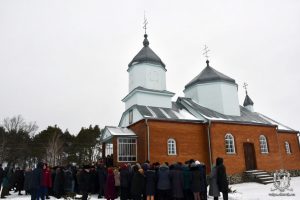
No less radical was the case in Bronytsia village, also located in Volyn Oblast. From the available data and video, it may be concluded that from the very beginning it was unclear who is voting — the whole municipality or only the members of the religious community. The local head of the municipality was actively participating and managing the process which makes it yet more unclear whether the voting was free from the influence of local politics.
Finally, approximately 700 people voted for the transition to OCU while 150 were against. The majority and the opposition, headed by the priest, couldn’t agree to anything. As a result, the local priest blocked the church and, as some witnesses tell on the video, began seizing the parish property.
Locals called the police, but it didn’t yet have legitimate reasons to take any decisive actions. There were claims of some people from other parishes of the UOC MP being brought to the place. Altogether, this chaos illustrates the judicial inaccuracy of both sides and the need for a clear list of parish members before voting.


Nonetheless, such faulty cases are rare, as is violence or the interference of local authorities in the process of transition. The most widespread accusation of UOC MP supporters is that gatherings to decide on the status of the church are convened by village/town heads and their participants are not necessarily church-goers. Such is the case in the Olenivka and Urvenna villages, where the status of church building is currently being disputed. There were some cases of SBU (State security service) performing searches in some parishes due to incitement to religious hatred but this can’t lead to restrictions being imposed on parishes of the Moscow Patriarchate as such, even if the accusations are proven.
Most of the parishes which migrated to the OCU — around 125 out of the total 167 — did it together with their priests. Very often, priests led the process. For example, this was the case in Vesele village in Luhansk Oblast (eastern Ukraine) or in Velyki Mosty town in Lviv Oblast (western Ukraine). In the second case, the transition was the easiest to implement — 234 people immediately voted for the change of affiliation and only 6 were against. The strong consensus didn’t leave any cracks for conflicts or disagreements. The transition of most parishes in central and western Ukraine was just as peaceful.
There are some visuals describing well-organized votings. The largest one is 1.5-hour video of a general meeting where arguments of all sides are presented and listened to without any conflicts or hostility.
The priest agreed to join any decision of the parish and finally, nearly all the people voted in favor of transitioning. Below are photos from the small Byten village where there was a vote of hands. In small villages, problems are rare — people know each other well and there is little room for falsifications.
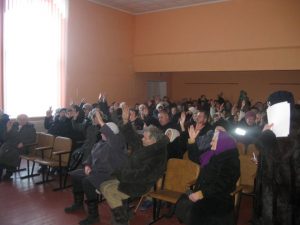
Many decide to remain in MP
The 167 Parishes that have already changed their affiliation during the last month don't make the weather, though - they constitute only 1.35% of MP. Whether the movement will accelerate further and whether the recent changes to the law will be fully implemented to make it yet more judicially organized is yet to be seen.
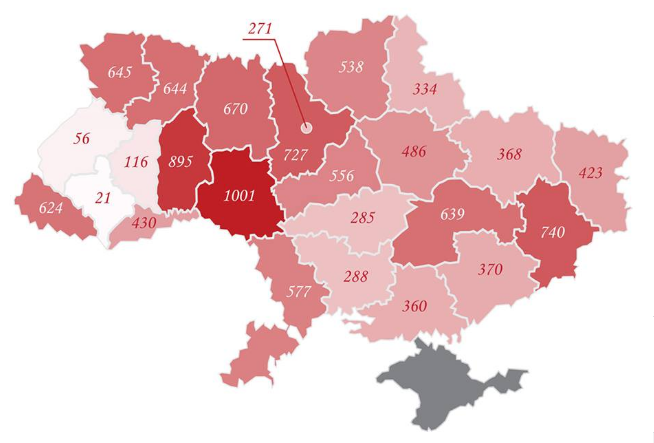
Currently, while many parishes are voting to migrate to the OCU, others vote to remain in the UOC MP, as trumpeted by the media of Moscow Patriarchate.
For example, the UOC MP's website reported that in Pohivka village (Ivano-Frankivsk Oblast), all the municipal community, not only the church community, participated in the voting for the transition to OCU, triggering a conflict. A few days after the voting, unknown OCU supporters changed the locks in the church during the night, and supporters of Moscow Patriarchate were not able to enter the building the next day. This is an example of a conflict where supporters of OCU appear to be in the wrong.
On the other hand, the media of the Moscow Patriarchate tend to overinterpret events. Often, they call a situation when over a hundred locals stood at the entrance to local church demanding the priest and 20 of his supporters to hand over the keys to the church a "church seizure." For example, this was the case in Nichohivka village in Volyn Oblast, where a gathering of the municipal community voted for the church's transition to the OCU. At the same time, the media of Moscow Patriarchate tend to exclude all the people who voted for the transition from the parish, even if there is only one church in the village, claiming that the voting was not legitimate. Speaking honestly, in most conflict situations it’s not possible to clearly define the truth right now - to conduct well-organized gatherings one more time is necessary but not easy.
Yet, the conflict situations are rare, if compared to fully legitimate gatherings of communities which decided to stay in MP. There are many parishes which freely decide to remain in Moscow Patriarchy: parishes in Kherson, Odesa, Sievierodonetsk, Ovruch, Balta and many other cities and villages. If people decide by the majority to remain in the Moscow Patriarchy no one has any possibility to question such a decision. Many parishes are choosing to leave MP, more are choosing to stay.
Majority of community is voting to remain in the Moscow Patriarchy. Source: Soyuz pravoslavnyh zhurnalistov


The State and the Church



The multitude of photos of Petro Poroshenko standing near Metropolitan Epifaniy or his “traveling” throughout Ukraine to present the Tomos in regions are sometimes interpreted as a strong interconnection between the state and the newborn Ukrainian Orthodox Church.
Nevertheless, although Petro Poroshenko is indeed capitalizing lavishly on the issue of Church independence from Moscow in his election campaign, there are so far no indications that the Church's actions are influenced by the state.
President Poroshenko indeed was a major advocate of the Ukrainian Church's independence.

However, the decision was made by Patriarch Bartholomew independently and the newborn Orthodox church of Ukraine has no obligations to the state.
Importantly, the church is not just a single entity controlled by Epifaniy or someone else. As each parish is autonomous and can choose freely its conformity, the state has very limited means of control over any church (be it Russian or Ukrainian) as an organization.
Also, the UOC MP has all rights to continue its actions in Ukraine with the only precondition of explicitly stating its affiliation with the Russian Orthodox Church in its name, as required by recent amendments to the law on official registration of any religious organization located in Ukraine but with a center of control in an "aggressor country."
According to Metropolitan Epifaniy,
“there is no definite [state] intervention in church affairs, as you asked, and as a church, we resolve issues that we have on the agenda on our own. The state can only contribute.”
Why believers leave the UOC MP
We examined 20 parishes out of the 167 to find out why people choose to break away from the Moscow Patriarchate. The reasons were mainly political, given the nearly five-year-long undeclared war with Russia. Perhaps the argument was best expressed in the words of a local woman from this video:
“We don’t want to glorify Kirill and the Russian church, as Russia kills our sons. Stop glorifying them and everyone will be satisfied.”
Yet, it would be important to emphasize that despite these very vocal reasons, there are some religious preconditions for transitions as well. The newborn Ukrainian church is free from pro-Russian propaganda, which makes it more attractive for many.
The prominent example is a quite recent case from Zaporizhzhia. The local priest of the Moscow Patriarchate refused to perform burial rites for a two-year-old child who tragically died. The reason for refusal was that the child’s parents belonged to the church of Kyiv Patriarchate. As it was explained by pastor Ihor Sava, the former colleague of that priest who served in the Moscow Patriarchate at that time,
“he was just scared... The rigid vertical of power in the Moscow Patriarchate deprives one of freedom. It reaches the point that silly policies exist even in things where the priest should have full authority. For example, in worship, sermons, communication with believers...”
After Ihor Sava refused to glorify Kiril and began his own prayers for the peace in Ukraine not authorized by the bishop, he was expelled from the Moscow Patriarchate. His parishioners supported him and they were praying in another self-created chapel.

“I support the OCU, for it’s an opportunity to get away from political influences on the church, in particular, from Russia,” Fr. Ihor told.
After the expulsion from the UOC MP, this parish did not defend its right to its cathedral but started praying in other places. Fr. Ihor explained.
“The church is not walls, not buildings, the church is a community of believers. This community came out from the UOC-MP and joined the OCU, finding a new place for liturgy. We didn’t deliberately defend the building of the temple, because I did not want to put believers in such conditions as to be persecuted even by physical violence. And this could happen, for I know the UOC MP. The temple is not so important for our church, it is even more convenient to worship in a new place — closer to the city center.”
Read also:
- A short history of the Ukrainian Church: infographic
- Tomos ante portas: a short guide to Ukrainian church independence
- Ukrainian Orthodox Church head says Russian Orthodox Church will remain in Ukraine as many want it and he’s not against that
- Old wine in new bottles: how bad habits derailed Ukrainian Church unification – interview with Cyril Hovorun




